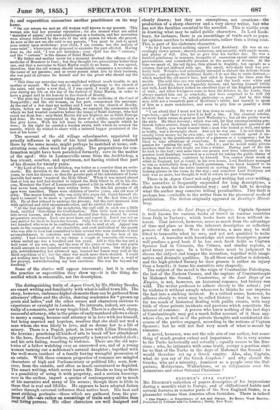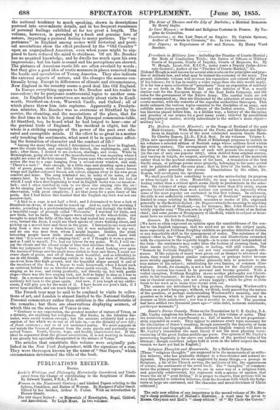BEECHER'S STAR PAPERS. * Mr. BEECHER'S collection of papers descriptive of
his impressions daring a month's visit to Europe, and of oldfashioned habits and natural features in remoter parts of the New England States, is a pleasanter volume than America often furnishes. There is indeed • Star Papers ; or Experiences of Art and Nature. By Henry Ward Beecher. Published by TrUbner and Co. London; Derby, New York.
the national tendency to much speaking, shown in descriptions pursued into over-minute details, and in too frequent recurrence of personal feelings exhibited at far too great a length. The volume, however, is pervaded by a fresh and genuine love of nature, imparting a pastoral feeling to many portions. The " ex- periences " in England among scenes with historical and poeti- cal associations show the effect produced by the "Old Country" upon an unprejudiced American, even when years might be sup- posed to have reduced the mind to staidness. Of art Mr. Beecher has no acquired knowledge, and he dwells too much upon his own impressions ; but his taste is sound and his perceptions are shrewd. The pictures of American rustic life are often overlaid by words ; but they give a good idea of rustic manners in places removed from the bustle and speculation of Young America. They also indicate the external aspects of nature, and the changes the seasons con- tinually bring. Except in differences of climate and circumstances, New England in the country seems a good deal like Old England.
In Europe everything appears to Mr. Beecher and his reader in rose-colour; for he postpones controversial topics to another occa- sion. In England his narratives are mainly about visits to Kenil- worth, Stratford-on-Avon, Warwick Castle, and Oxford ; all of which places threw him into raptures. Apparently a Presbyte- rian minister, Mr. Beecher was so overcome at Stratford by the service, the chanting, and the associations of the place, that for the first time in his life he joinad the Episcopal communion-table. At Stratford, too, he heard what he had longed to hear—one of the poetical birds of England. The incident is slight, but the whole is a striking example of the power of the poet over edu- cated and susceptible minds. If the effect be so great in a matter only touching the sentiments, what must it be in questions affect- ing the formation of character and the conduct of life ?
"Among the many things which I determined to see and hear in England, were the classic birds, and especially the thrush, the nightingale, and the lark ; after these, I desired to see cuckoos, starlings, and rooks. While in Birmingham, going about one of the manufactories, I was inquiring where I might see some of the first-named. The young man who escorted me pointed across the way to a cage hanging from a second-story window, and said, There's a lark ! ' Sure enough, in a little cage and standing upon a hand- ful of green grass, stood the little fellow, apparently with russet brown wings and lighter-coloured breast, ash colour, singing away to his own great comfort and mine. The song reminded me, in many of its notes, of the canary-bird. In my boyhood, I had innocently supposed that the lark of which I read when first beginning to read in English books was our meadow- lark ; and I often watched in vain to see them rise singing into the air ! As for singing just beneath 'heaven's gate' or near the sun, after diligent observation, with great simplicity, I set that down for a pure fancy of the poets. But I had before this learned that the English sky-lark was not our meadow-lark.
"A bird in a cage is not half a bird ; and I determined to hear a lark at Stratford-on-Avon, if one could be scared up. And so, early this morning I awoke, according to a predetermination, and sallied out through the fields to a beautiful range of grounds called Welcombe.' I watched for birds, and saw birds, but no larks. The reapers were already in the wheat-fields, and brought to mind the fable of the lark who had reared her young there. Far over, toward the Avon, I could see black specks of crows walking about, and picking up a morsel here and there in the grass. I listened to one very sweet song from a tree near a farm-house ; but it was unfamiliar to my ear; and no one was near from whom I might inquire. Besides, the plain labouring people know little about ornithology, and would have told me that it is some sort of a singing-bird,' as if 1- thought it were a goose ; and so I said to myself, l've had my labour for my pains. Well, I will en- joy the clouds and the riband strips of blue that interlace them. I must re- voke my judgment of the English trees; for as I stood looking over upon the masses of foliage and the single trees dotted in here and there, I could see every shade of green, and all of them most beautiful, and as refreshing to me as old friends. After standing awhile to take a last view of Stratford- on-Avon from this high ground, and the beautiful slopes around it and of the meadows of the Avon, I began to walk homeward, when I heard such an outbreak behind sue as wheeled me about quick enough. There he flew, singing as he rose, and rising gradually, not directly up, but with gentle slope—there was the free singing lark, not half so happy to sing as I was to hear. In a moment more he had reached the summit of his ambition, and suddenly fell back to the grass again. And now, if you laugh at my enthu- siasm, I will pity you for the want of it. I have heard one poet's lark, if I never hear another, and am much happier for it."
The French tour may be said to be confined to visits to collec- tions of art, and London is almost limited to the National Gallery. Personal commentary rather than criticism is the characteristic of the remarks ; but there are observations displaying acumen, of which this on the statues of Venus is one.
"Contrary to my expectation, the greatest number of statues of Venus, as a divinity, are anything but voluptuous. Her freaks, in the fabulous his- tories, were surely wanton enough ; but the ancients evidently bad a con- ception of her which we do not at all take in,—as the divinity of new life; of fresh existence, and so of yet unstained purity. We must separate in our minds the Venus of pleasure from the more purely and poetically con- ceived Venue. Youth, beauty, hope, and health, characterize her. if this ideal be separated from the grosser associations, it is not wanting in beauty. I am greatly but agreeably disappointed in the statues of Venus."
The articles that constitute this volume were originally pub- lished in the New York Independent, with the signature of a star. They were thereupon known by the name of" Star Papers," which circumstance determined the title of the book.



































 Previous page
Previous page